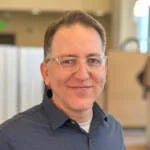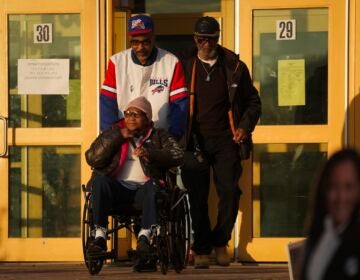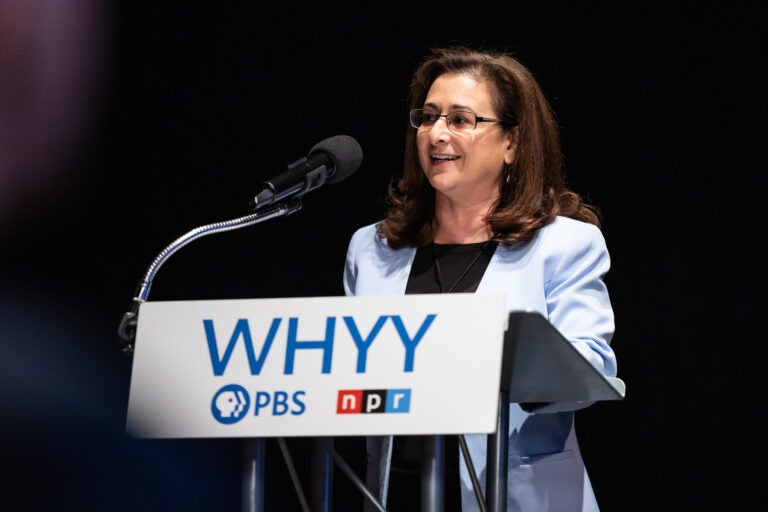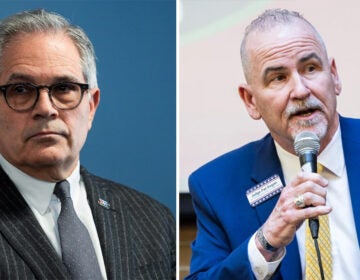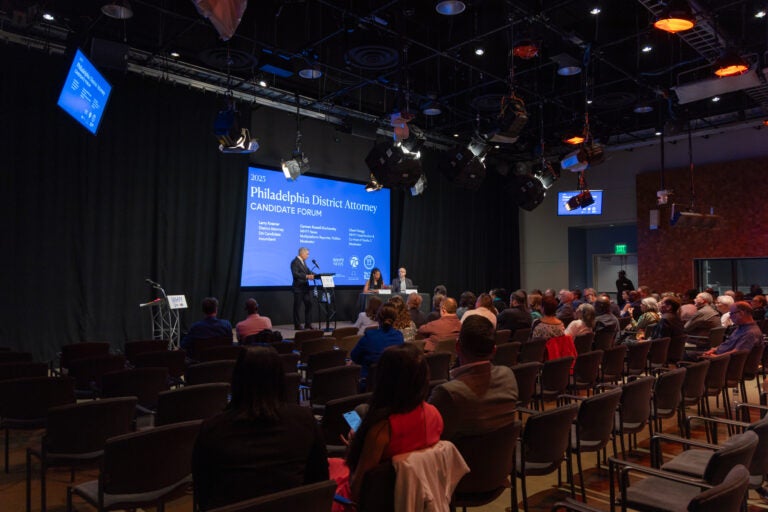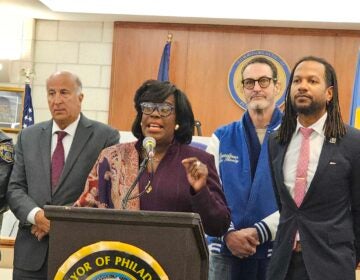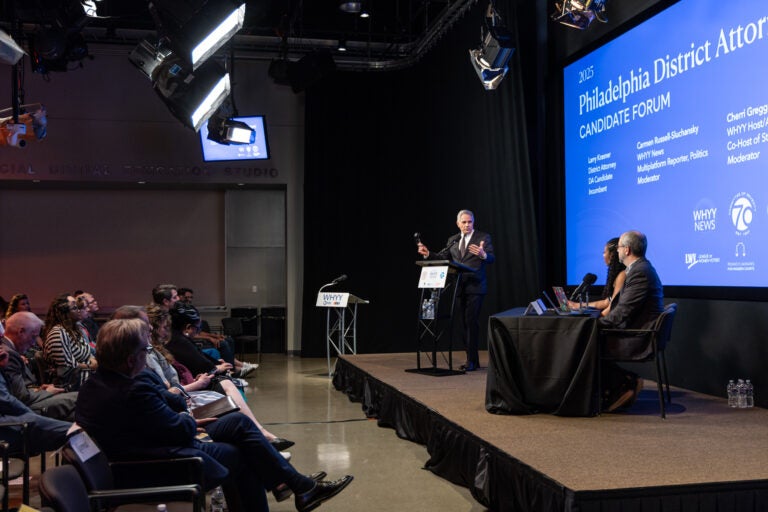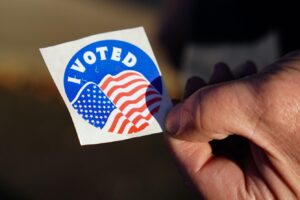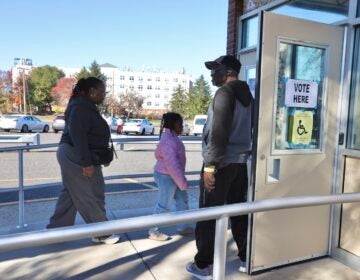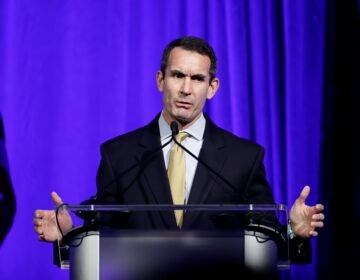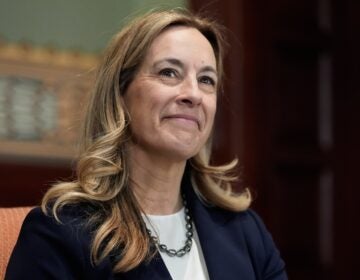As Dugan skips Philly district attorney candidate forum, Krasner speaks on his record
A district attorney debate turned into an hour-long questioning of incumbent Larry Krasner when challenger Patrick Dugan declined to attend.
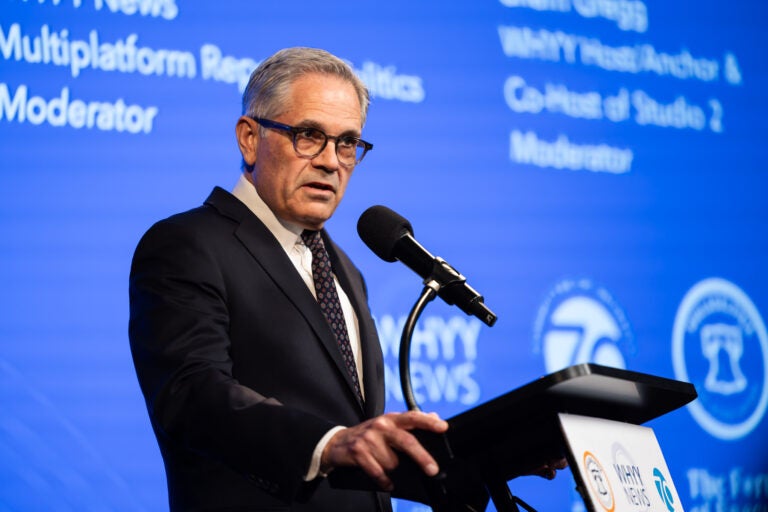
Philadelphia District Attorney Larry Krasner defended the policies of his first two terms at a candidate forum at WHYY on April 22, 2025. (Kimberly Paynter/WHYY)
What questions do you have about the 2025 elections? What major issues do you want candidates to address? Let us know.
This story originally appeared on WHYY’s Billy Penn.
A district attorney candidate debate turned into an hour-long questioning of incumbent Larry Krasner after challenger Patrick Dugan declined to participate in the event Tuesday night.
Dugan’s decision not to attend could mean they won’t face each other in an official debate before the May 20 Democratic primary. With no Republican running, the primary will effectively decide the winner in November’s election of Philadelphia’s top prosecutor for the next four years.
While the two candidates have answered questions and exchanged barbs at a number of debate-like forums over the past month, Tuesday night’s event was expected to be the race’s only formal debate.
Like many first-time candidates seeking to boost their name recognition and unseat well-established incumbents, Dugan has called for multiple debates, including at least one broadcast live on network TV. Krasner has declined, saying he would only participate in the Tuesday event at WHYY’s studios in Old City. The public could attend in person, and the event was broadcast live on YouTube and Facebook.
“If Larry will only agree to one debate against Judge Dugan, then it must be on network broadcast television as is customary for city-wide races in past elections to reach the most Philadelphia voters possible,” Dugan’s campaign said Tuesday afternoon.
Krasner’s campaign has described Dugan’s complaints about the debate schedule as “the antics of a losing campaign with a failing message,” and organizers of the event expressed disappointment at the retired Municipal Court judge’s decision to pull out.
“WHYY and its partners have worked to ensure this event is fair, nonpartisan and focused entirely on public service,” WHYY spokesperson Tory Harris said. “Both candidates were offered an equal opportunity to share their vision for Philadelphia’s future. Choosing not to participate denies voters the chance to hear directly from all candidates in a setting designed to rise above politics.”
The debate was co-sponsored by WHYY News, the Committee of Seventy and the Philadelphia Bar Association.
Defending ‘mercy’ toward retail thieves
Despite Dugan’s absence, more than 70 people in the audience, plus online viewers, heard Krasner address many of the same criticisms his challenger has leveled at him during previous forums.
The moderators were Cherri Gregg, co-host of WHYY’s “Studio 2” program, and WHYY News reporter Carmen Russell-Sluchansky. They questioned Krasner about hot-button issues like persistently high rates of retail theft, his relationship with police department leaders, the ways that criminal defendants are selected for diversion programs that let them avoid prison sentences, and the DA office’s prosecution of police officers and former prosecutors accused of misconduct.
Krasner noted that crime overall is down, with the homicide rate at a 50-year low, and that while retail thefts are still high, they are down 8% so far this year compared to the same period in 2024, according to police department data.
He defended his policy of dispensing “mercy” to the 80% of retail theft defendants who he said do not have prior records, and of trying to help repeat offenders.
The policy “goes very vigorously after prolific retail thieves, while simultaneously recognizing, if you just put them in jail for a year or two years but you don’t deal with the underlying deep mental health issues, you don’t deal with the underlying addiction, you don’t deal with the underlying poverty, they will do those couple years and come out and do it again,” Krasner said.
As for organized, professional thieves, “they’re just not going to get mercy,” he said.
When Gregg asked about the locking up of drugstore merchandise and store closures that have been blamed in part on rampant theft, Krasner said some pharmacy chains have been shrinking because they had opened too many stores and were sued over irresponsible dispensing of opioids.
Mixed feelings toward Wellness Court
Russell-Sluchansky asked about the perception that Krasner’s vigorous prosecution of police misconduct has harmed collaboration with police and City Hall and made it harder for the Philadelphia Police Department to recruit and retain officers.
Krasner responded the he gets along “extremely well” with Police Commissioner Kevin Bethel — “He and I talk frequently, text frequently, meet frequently,” the DA said — and he praised Fraternal Order of Police President Roosevelt Poplar, whose predecessor John McNesby was a fierce critic and antagonist of Krasner earlier in his tenure.
“I don’t accept the narrative that I’m not getting along with the police when I get along so well both with the commissioner and with the head of the FOP,” Krasner said.
He also said he likes Mayor Cherelle Parker personally and thinks “she is trying really hard to do good things in this city.”
The comment about Parker was part of an answer to a question about the city’s new Wellness Court, a key element in the mayor’s larger effort to suppress Kensington’s open-air drug market and improve the neighborhood.
The court aims to quickly move homeless drug users into treatment, but has been criticized for potentially infringing on defendants’ civil rights and for so far helping just a few people.
Krasner said the court “has evolved in a more positive direction” since it was first announced, but he urged city officials to consult with legal and medical experts and learn from similar programs that have been effective in other cities.
“We need to be included, and so does the judiciary, so does the public defender’s office, and so does the medical profession — people who have deep expertise in what it means to have a level-one bed versus a level-four bed,” he said, referring to the care options available to those in addiction treatment. “These details make all the difference.”
The argument for diversion programs
The moderators asked a series of questions about diversion programs and how the DA’s office makes decisions to prosecute defendants, including young offenders who could be prosecuted as adults.
Krasner said his attorneys have been trying to resolve more cases through the juvenile court system, which offers a range of rehabilitation services, but state law requires that the adjudication of some serious offenses begin in adult court, and it’s up to judges to decide where they end up.
Leaders at the district attorney’s office have recently been emphasizing to the office’s attorneys the policy of preferring juvenile court and of trying to reduce the incidence of young defendants making plea agreements unnecessarily, he said.
“I never want to be in a situation where we have a young person who pleads guilty … to something they didn’t do just to get back [into juvenile court],” Krasner said. “I always want them to have the opportunity to have their day in court where that’s possible.”
The DA’s office has “drastically expanded diversion” within juvenile court and created a new Emerging Adult Unit that seeks to help offenders aged 18 to 25 who, like adolescents, are still “evolving psychologically,” Krasner said.
That said, a variety of factors have to be taken into consideration when deciding who to divert and who to prosecute traditionally, such as whether the offender has addiction problems, unaddressed deep trauma, a prior record, intellectual deficits or other issues, Krasner said. “It’s extremely specific to each case,” he said.
On the broader issue of diversion programs, Krasner defended his policy of moving away from previous district attorneys’ tougher stances on prosecuting those arrested for illegal gun possession and other crimes, saying data showed those past policies did not lead to less crime.
In one diversion program for people who were arrested for illegal gun possession but “did not appear to be criminals,” Krasner said, participants “were much less likely to ever be arrested again than an equivalent group of people who were convicted. The ratio was 1 to 4.”
“I do not want to see more crime. But I also don’t think that the system should be a cult of punishment. If you can make society safer by making people accountable and making them do a lot of work after they illegally possess a gun, then that’s what you ought to do, because ultimately, it’s not primarily about the person possessing the gun. It’s about making society safer,” he said.
Krasner also discussed a number of other issues, including fighting the Trump administration, Philadelphia’s sanctuary city policy, victim advocacy, staff turnover in the DA’s office, attorney recruitment and training, cash bail, prison conditions and the future of the progressive district attorney movement.
To view the full debate, view the embedded video above or check out the recording on WHYY’s Facebook page.
WHYY is your source for fact-based, in-depth journalism and information. As a nonprofit organization, we rely on financial support from readers like you. Please give today.


